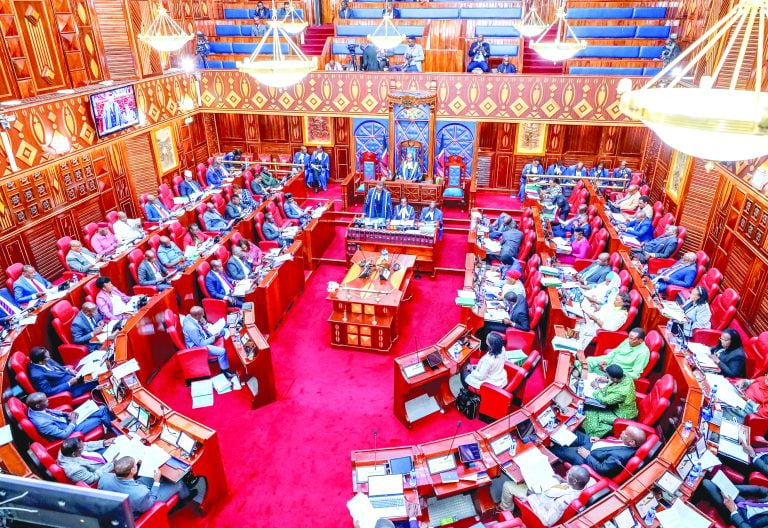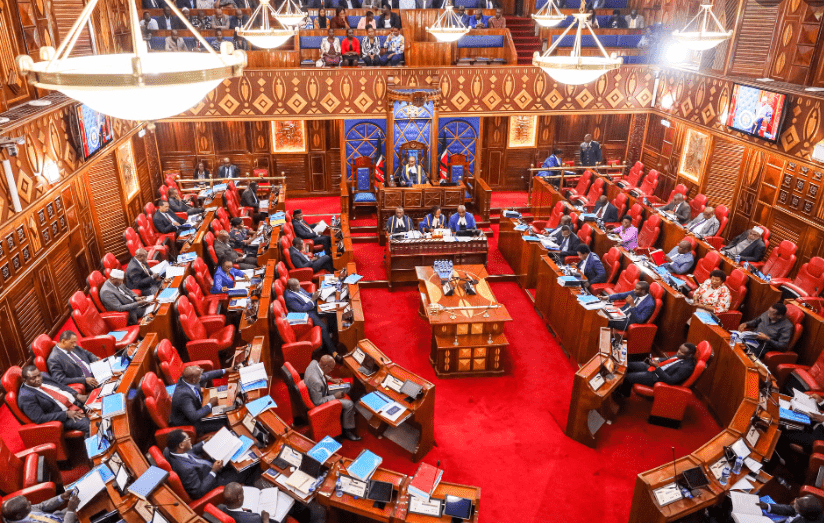Senators call for halting of parks construction and review of deals

Senators want the Ksh23.5 billion County Aggregation Industrial Parks (CAIPs) project halted until a proper master plan is in place and comprehensive feasibility studies are done across the 47 county governments.
Lawmakers demanded that the Ministry of Trade, Investment and Industry tables a comprehensive report on the procurement of the construction of the CAIPs and the contractors who are participating in the projects.
CAIPs aim to establish industrial spaces within each county, facilitating aggregation, value addition, and primary processing of agricultural products.
In addition, CAIPs will house an aggregation centre that will have a section for collection, sorting, grading, cleaning, packaging and cold storage and will have the value addition, processing equipment and common user facilities.
Senate Trade and Investment Committee, chaired by Kwale lawmaker Issa Boy Juma, took Trade Cabinet Secretary Lee Kinyanjui to task as he sought to explain why the national government initiated CAIPs without conducting feasibility studies for counties to decide on their needs.
Vihiga Senator Godfrey Osotsi fired the first salvo, raising concerns about land ownership where the Industrial parks should be constructed, and questioning if the feasibility studies were done before the commencement of the projects.
Pilot projects
In particular, he singled out his home county, claiming that the parcel of land earmarked for the industrial park belongs to Kenya Railways and calling on the Ministry of Trade to halt the construction.
Instead, Osotsi rooted for using some 13 counties that have already completed construction of the parks to be used as pilots.
“Treat these 13 counties as pilot counties and halt the process until we have a good master plan and a comprehensive feasibility study done in the remaining counties. What was the level of involvement of counties in the procurement process of these industrial parks?” posed Osotsi.
The senator went on to point out that the law provides that if one level of government is implementing a function of the other, then there is a need to have an Intergovernmental Agreement between the national government and the county to ensure proper oversight and procurement processes.
The Trade CS, however, disclosed that the ministry acknowledged the need for better oversight and procurement processes, with plans in place to improve the situation in future projects.
“We acknowledge that some steps were omitted, but the broad conceptualisation of the project is good. The ministry is working on a master plan for industrial parks to inform development and avoid past mistakes,” said Kinyanjui.
Kinyanjui further disclosed that the ministry was working on improving the procurement process and ensuring better oversight to address the challenges identified.
Already Busia, Bungoma, Nakuru, Trans-Nzoia, Migori, Homa Bay, Siaya, Kisii, Nyamira, Meru, Garissa, Mombasa, Machakos, Uasin Gishu, Kirinyaga and Embu County governments have completed the first phase of their projects.
The CS told the committee that apart from the counties that had already completed Phase One being funded jointly between the two levels of government, 20 other counties out of the remaining 31 have initiated construction with their own funding and reported construction progress above 10 per cent.
CAIPs aims to promote and attract investments in value addition for products from agriculture, fisheries and livestock farming by raising the productivity of key value chains.
According to Kinyanjui, in the financial year 2023/2024, the national government allocated Sh4.7 billion for the project; with Sh4.5 billion meant for the construction of CAIPs in Phase One counties and Sh200 million for programme support, project coordination, monitoring and capacity building.
Budget deficits
However, during the supplementary budget 2023/2024, the budget allocation for CAIPs was reduced from Sh4.7 billion to Sh4.5 billion and by the close of the financial year, the national government had only disbursed Sh1.152 billion resulting in an outstanding balance of Sh3.348 billion.
“In the financial year 2024/2025, the State Department for Industry has been allocated Sh2 billion for the construction of CAIPs. There was an outstanding balance of Sh3.348 billion. With this allocation, the State Department still has a deficit of Sh1.348 billion to complete the construction of CAIPs in the initial phase one counties,” said Kinyanjui.
In the first half of the financial year, the national government disbursed Sh1 billion, which now brings the total disbursement to counties to date to Sh2.152 billion.
According to the Intergovernmental Agreement on the establishment of the CAIPs, the national government through the State Department for Industry, is supposed to transfer to each county government a sum of, Sh250million for the construction of CAIPs as a conditional grant.
The national government has so far disbursed Sh2.03 billion to 13 counties, including Kisii and Wajir Sh250 million each, Kwale Sh197 million while Migori, Meru, Embu, Busia, Bungoma, Machakos, Uasin Gishu, Garissa, Homa Bay and Kirinyaga have been given Sh133.3 million each.













